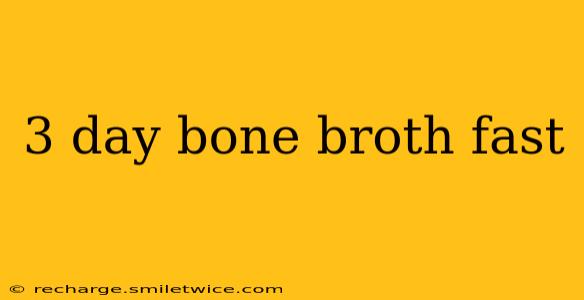The idea of a 3-day bone broth fast is gaining traction among health enthusiasts seeking a cleansing and potentially restorative experience. But what exactly is it, and is it right for you? This comprehensive guide delves into the benefits, risks, and practical aspects of undertaking a 3-day bone broth fast, addressing common questions and concerns.
What is a Bone Broth Fast?
A bone broth fast, unlike a complete water fast, involves consuming only bone broth for a specified period, usually a few days. Bone broth is a nutrient-rich liquid made by simmering animal bones, often with added vegetables and herbs. It's touted for its high concentration of collagen, gelatin, minerals (like calcium, magnesium, and phosphorus), and amino acids, making it a potentially satiating and nourishing alternative to a complete fast. The goal is to provide the body with essential nutrients while restricting caloric intake, promoting cellular repair, and potentially aiding in detoxification.
Is a 3-Day Bone Broth Fast Safe?
This is crucial: Before embarking on any fast, consult your doctor, especially if you have pre-existing health conditions like kidney disease, gout, or autoimmune disorders. While bone broth is generally considered safe for most people, a prolonged fast can strain the body, and individual reactions vary greatly.
Benefits of a 3-Day Bone Broth Fast
Proponents claim several potential benefits, though scientific research is limited:
- Gut Health Improvement: The gelatin and collagen in bone broth may soothe the gut lining and improve digestion.
- Improved Joint Health: Collagen is a key component of cartilage, and some believe consuming it can support joint health and reduce inflammation.
- Boosted Immunity: Bone broth is rich in nutrients that support immune function.
- Weight Loss: The reduced caloric intake can contribute to weight loss, although this is often temporary and depends on overall lifestyle factors.
- Detoxification: Some believe fasting promotes detoxification, though this needs further scientific investigation.
Risks of a 3-Day Bone Broth Fast
Several potential risks are associated with bone broth fasts:
- Nutrient Deficiencies: Restricting food intake can lead to deficiencies in essential vitamins and minerals, especially if the fast is prolonged.
- Electrolyte Imbalances: Electrolyte imbalances can be dangerous and should be monitored closely, especially during longer fasts.
- Fatigue and Weakness: Reduced caloric intake can cause fatigue, weakness, and dizziness.
- Headaches and Dizziness: These are common side effects of fasting due to changes in blood sugar levels.
- Muscle Loss: Prolonged fasting can lead to muscle loss if not carefully managed.
How to Prepare for a 3-Day Bone Broth Fast
Preparation is key. Gradually reduce your food intake in the days leading up to the fast. This helps your body adjust to the reduced caloric intake and minimizes potential side effects. Ensure you're adequately hydrated. Talk to your doctor before starting.
What to Expect During a 3-Day Bone Broth Fast
You might experience:
- Hunger pangs: These are expected, but they should lessen as your body adapts.
- Fatigue: Rest is important during a fast.
- Headaches: These can be managed with hydration and rest.
- Changes in bowel movements: This is normal.
What to Eat After a 3-Day Bone Broth Fast
Gradually reintroduce food after the fast. Start with easily digestible foods like fruits, vegetables, and small portions of lean protein. Avoid processed foods, sugars, and excessive fats initially. Listen to your body and eat slowly.
### What are the potential side effects of a bone broth fast?
Potential side effects include fatigue, headaches, dizziness, nausea, constipation, and nutrient deficiencies. These are more likely with longer fasts or if not properly prepared. It's essential to listen to your body and stop if you experience severe symptoms.
### How much bone broth should I drink during a 3-day fast?
There's no single answer. Drink bone broth whenever you feel hungry, aiming for enough to feel satiated but not overly full. The amount will vary depending on individual needs and preferences.
### Can I exercise during a bone broth fast?
Light exercise is generally okay, but avoid intense workouts that could deplete energy. Listen to your body and reduce intensity if needed.
### Will I lose weight on a bone broth fast?
Weight loss is a potential outcome, but it's often temporary and depends on various factors. Any weight lost is likely to be primarily water weight. Sustainable weight loss comes from lifestyle changes beyond just a short-term fast.
Disclaimer: This information is for educational purposes only and does not constitute medical advice. Consult your doctor before undertaking any fast, especially if you have underlying health conditions. This is not a substitute for professional medical advice.
